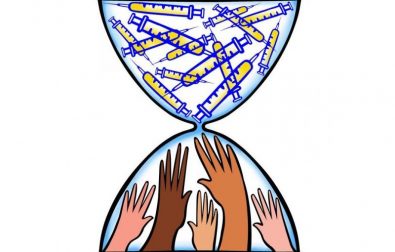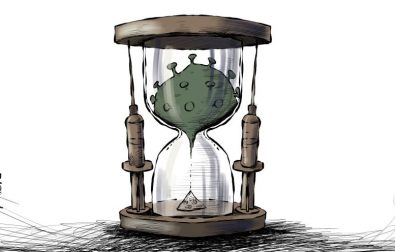With nine in ten Portuguese citizens and seven in ten registered foreigners vaccinated for Covid-19, Portugal leads Europe as a vaccination success story. A new pan-European study suggests that Portugal has also been a leader in vaccinating its undocumented population. In fact it is impossible to know how many of those in irregular situations have received the vaccine, and there is evidence that Portugal’s record is less outstanding in reality than on paper.
In an analysis by Lighthouse Reports, Portugal and the United Kingdom were, in a group of 18 European Union countries, the ones with the highest scores in an assessment of the accessibility and openness of Covid-19 vaccination for undocumented people.
👉All the articles from this investigation
From this research – compiled from official documents, government communications and parliamentary document records among others – Portugal emerges positively in almost all categories: policy transparency, access for marginalised people, identification and residency requirements and privacy guarantees.
In other words, the policies developed are praised. But the way in which the policies are put into practice is another matter. Despite having created a platform for immigrants without a health number to register for vaccination, the government is unable to gauge how many of the approximately 74,500 who were vaccinated this way are undocumented. Numbers are also lacking on the number of people vaccinated through an alternative in-person process that enabled applicants to bypass the buggy online registration.
Online registration system plagued with problems
On the ground, Mariana Hancock, responsible for the vaccination process at the Padre Alves Correia Centre (CEPAC), which supports immigrants mainly from African countries, considers that "the vaccination of immigrant people was a second-order priority".
Even without the language barrier, Brazilian Diego de Toni, also waiting for a residence permit, reports a confusing vaccination process: "I went to a health centre near my house and each place sent me somewhere else. I would be told: 'This document is missing, it's not here, you have to go to another centre...'. I was in this ping-pong, stressing myself out, getting tired.”
“If I don’t have NHS I can’t do anything – when you’re a migrant here things can go wrong very easily”
He had almost given up when a neighbour helped him. Eventually, he managed to get a provisional health number before his vaccination in June. The information is unclear, he says, "There should be a standard, things should be standardised."
For those without an employer organising vaccination, the processes were more difficult. Manish Dehraj, 23, who has been living in Porto for ten months, requested his health number in July, and was only vaccinated with a first dose at the end of September in a vaccination centre he found on Google. Dehraj says he felt nervous while waiting for the number, which he was only given once vaccinated: "If I don't have the health number I can't do anything – when you're a migrant here things can go wrong very easily."
A March 2020 decree allowed immigrants with dossiers pending at the Foreign Borders Service (SEF) to obtain a provisional health number. However, it left out all those who had not yet managed to get their information into the system.
Health centres sent immigrants home
Victor Hastenreiter, from Casa do Brasil, which supports the largest foreign community in Portugal, points to the difficulties experienced with the platform by those without digital literacy. He says that "many health centres sent people home. [...] It was very confusing, even the health centres were not prepared to recognise the decree, or to recognise that people had the right to a health number. There was a lack of information, a lack of a single protocol. What went well, in the end, were the in-person 'open houses' – where you didn't need a health number, or to sign up on the platform."
CEPAC supported several people in filling out the form on the platform. By May 2020 they found that no one was even contacting them. "In meetings with the task force they asked us to get people to sign up again."
“Open houses” fail to reach everyone without registration
To reach all those locked out by the official registration process, Portugal offered “open houses” for undocumented people to get vaccinated, but many people did not know about them.
It is the lack of clear and official information about where you can be vaccinated without a National Health Service (NHS) number that Sultan Mohammed – an Indian who arrived in Portugal from Latvia, where he studied aeronautical engineering – complains about.
It was through a friend that he learnt where he should get the vaccine. Mohammed says that many people who did not receive the NHS number were waiting for communication from the government. "For example, if you go to Facebook, or even an official website, they won't give you information: 'If you don't have an NHS number come here', 'do this and you can get the number'."
Communication vacuums hinders government’s good intentions
He adds that the language barrier was one of the primary obstacles to accessing the vaccine., It was also a factor which increased mistrust and uncertainty about the vaccine amongst the undocumented community.
There was a lack of a thought-out communication strategy for the new arrivals in Portugal, he says. For months, Mohammed waited for his health number: "It is a life-or-death situation for an immigrant. This plays a big part in our lives: a citizen can go out on the street and shout, an immigrant can't do that."
Lavu Sidhu, a 22-year-old Indian construction worker in Lisbon, was vaccinated while he was picking strawberries in Southern Portugal. His employer scheduled the vaccination. Still, he has no health number or residency card.
"Everyone was aware that it was a difficult process to manage worldwide,'' says Mariana Hancock . “Some steps could have been taken strategically so that these people were not left at the end of the line. Only at the end did they 'open house' for these people, why not before?"
Victor Hastenreiter adds that "there was a feeling that immigrants were the last to be vaccinated, and this applies to people in both irregular and regular situations".
In response to PÚBLICO, the government stated that it has guaranteed universal and free access to vaccination against Covid-19. It added that "specific funds [were] not budgeted for the vaccination of foreign citizens"and that immigrants, "documented or undocumented", "were called for vaccination on the basis of eligibility arising from the criteria established by the task force, subject to the same rules as the entire population.”
👉 Original article at Público.
Was this article useful? If so we are delighted!
It is freely available because we believe that the right to free and independent information is essential for democracy. But this right is not guaranteed forever, and independence comes at a cost. We need your support in order to continue publishing independent, multilingual news for all Europeans.
Discover our subscription offers and their exclusive benefits and become a member of our community now!















